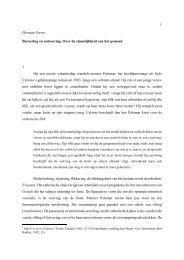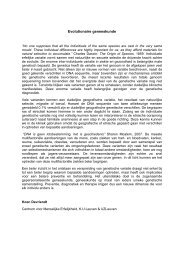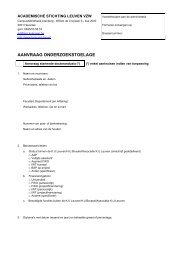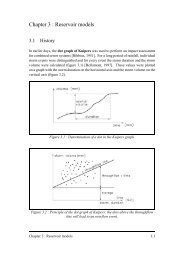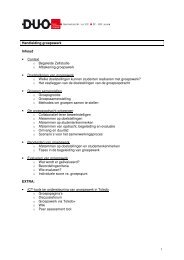EQUALITY GUIdE - KU Leuven
EQUALITY GUIdE - KU Leuven
EQUALITY GUIdE - KU Leuven
Create successful ePaper yourself
Turn your PDF publications into a flip-book with our unique Google optimized e-Paper software.
128 Equality Guide<br />
dents and postdoctoral students is gender-neutral, while there might be a preference for<br />
men when succession is concerned. Three men could think of examples in which their<br />
supervisors (m/f) wanted a male researcher. Among the women, less researchers (6)<br />
think recruitment is gender-neutral. Three women think personal bonds are important,<br />
irrespective of gender. Seven women think their departments prefer men. One of them<br />
thinks women have to excel men in order to be selected, others think the fear of a<br />
pregnancy and maternity leave makes supervisors recruit more men. Another woman<br />
stated that it was very clear that men were put forward when it came to promotion.<br />
One woman said that she was even discouraged to write an application. In addition, a<br />
member of a committee reviewing her application, said to her: “So, Miss X., you want<br />
to write a doctoral dissertation? Do you realize you won’t have the chance to have a<br />
private life then? Are you comfortable with that?”<br />
Half of the male researchers (8) we interviewed do not think men’s networks are larger<br />
or more supportive. Two men said women are even more versed in building networks.<br />
Six men think gender does play a role in that respect. Three of them believe<br />
men create meaningful bonds after work whereas women are often excluded from<br />
these informal networks. Teambuilding often takes place when women are looking<br />
after their children, and the high proportion of men in formal networks affects the presence<br />
of women in those networks. Another man thinks women prefer to go to an early<br />
lecture at congresses to exploring the city at night with their colleagues. More women<br />
(10) than men do not believe gender plays a role in developing a network or building a<br />
reputation. Three of them think it depends on the gender ratio in their fields: two<br />
women in a masculine field said they were more easily known, one woman in a highly<br />
feminized domain added that the few men involved were quickly spotted. As many<br />
women as men (6) think gender definitely plays a role in networking. Five women said<br />
they only have half the time due to family commitments. One of them said she does<br />
not meet up with other researchers after work when she is abroad. A last respondent<br />
believes women have smaller egos and less self-confidence to make themselves known.<br />
Four men realize it is necessary to search for support to be promoted, but do not look<br />
forward to it. Ten men said they had never invoked contacts to enhance their chances.<br />
One man has a small but very effective network that has led him to his current position.<br />
Four women also said it is important to find support to advance a career, but are<br />
not willing to play the game. They want to prove themselves through their work and<br />
refuse to invoke their contacts in advancing their careers. Two women said they consulted<br />
particular people to get support, but received the wrong advice, which eventually<br />
led to the contrary.<br />
5.5. Conclusions and recommendations<br />
One of the main reasons to leave Ghent University for both women and men is the<br />
work insecurity and short-term contracts. The heavy competition, obscure criteria,



